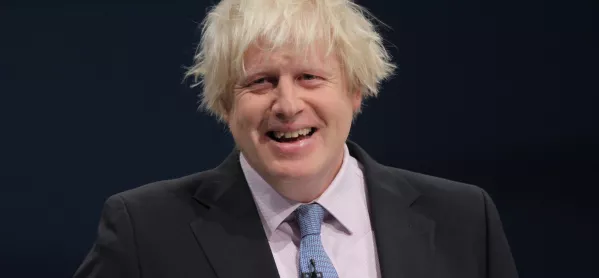- Home
- ‘If teachers said what Boris said they’d be fired’
‘If teachers said what Boris said they’d be fired’

Enjoying my summer holiday - silly season for teachers as well as politicians - I found myself listening to the lunchtime news today and hearing Boris Johnson being defended against accusations of Islamophobia by a fellow Conservative MP.
In a piece for the The Daily Telegraph opposing Denmark’s ban on women wearing the niqab or the burka, Johnson wrote that “it is absolutely ridiculous that people should choose to go around looking like letter boxes” and later likened women who wore them to “bank robbers”.
Johnson has been asked to apologise by the chairman of the Conservative Party, but has so far refused to do so.
The question that came to my mind was how all this might have played out if I had made the same comments in a classroom. This is not a moot point. Like politicians, teachers have a duty of leadership in public life, and this means that we are rightly held to a higher standard than others. Boris Johnson is - it is widely claimed - hoping to become the next leader of this country. So is it not right that he is held not just to a higher standard than the general public, but to one higher than those of us with far less influence than him who work in schools? Yet - as it stands - this is not happening.
Imagine if I had stood up in a lesson and joked about Muslim girls in my class looking like letterboxes and bank robbers. Would I expect to escape sanction? Of course not. A cursory look online makes it abundantly clear that, rightly, I would face action under my school’s dignity at work and equal opportunities policies.
According to the latter document, as a teacher I have a duty “to treat people with dignity at all times and not to discriminate against or harass others”.
The dignity at work policy is even stronger. Behaviour that can “make a person feel vulnerable, upset, undermined or humiliated” is classed as bullying. “Being sarcastic towards, ridiculing or demeaning others, inappropriate and/or derogatory remarks” are also cited as examples of bullying behaviour. Yet Johnson is - currently - not being held to these standards.
‘Flag-waving piccaninnies’
His argument in refusing to apologise is that doing so would be counter to free speech. Are we seriously saying that a man who wants to be prime minister wants to defend his right to insult and ridicule some of the very citizens he hopes to lead, people he hopes to command the respect of? Are we saying that remarks that are covered by a widely used definition of bullying should attract no sanction because they are “just Boris”? Just Boris, who called Barack Obama “part Kenyan, with an ancestral dislike of the British empire”. Just Boris who, in another Telegraph piece, wrote that the Queen must love touring the Commonwealth because “she’s greeted by cheering crowds of flag-waving piccaninnies”.
I wonder if The Daily Telegraph and senior figures in government would leap to my defence if my school sanctioned me for making these same remarks that Johnson has?
Johnson’s supporters claim that none of this should be taken seriously, that he uses jokes to disarm in order to get his ideas across. But any point he was making about opposing a ban on burqas has been lost in ridiculing a vulnerable section of society. While he will vehemently defend himself against accusations that he is racist, his mockery of these Muslim women emboldens those with racist views. The loutish attack on a socialist bookshop at the weekend by a far-right group is just one example of this. As a leader of the Brexit campaign, he should surely be sensitive to the fact that hate crimes involving racial and religious discrimination increased by more than a third after the referendum.
Bullying, my school’s policy makes clear, is often about the misuse of power. What Johnson seems to miss is that “it was just a joke” has to be framed in terms of power dynamics. What is sanctionable for pupils to say about me is - quite rightly - different to what I can appropriately say about them.
Satire should only ever be used to puncture the bellies of those in power above us, never to trample on those with less power below.
Boris’ repeated choice to defy this is dangerous, and any refusal by the Conservative Party to sanction him even more so.
He plays the fool, while wielding power and influence. This is wrong, and - like any leader would expect in school or politics - he should be held to account.
Kester Brewin teaches mathematics in south-east London. While working as a teacher, he has been a consultant for BBC Education, and is the author of a number of books on culture and religion. He tweets as @kesterbrewin
Keep reading for just £1 per month
You've reached your limit of free articles this month. Subscribe for £1 per month for three months and get:
- Unlimited access to all Tes magazine content
- Exclusive subscriber-only stories
- Award-winning email newsletters



